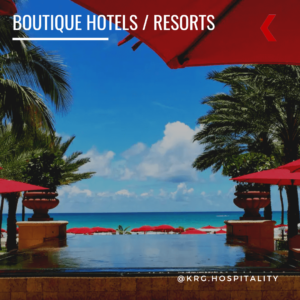Developing a Legacy and Brand Equity with a Boutique Hotel
by Doug Radkey

Imagine staying at a boutique hotel that leaves a lasting impression, so much so that you share your experience with everyone that you know.
We’ve all surely been there and experienced that at some point in time and realistically—that should be the goal of every operating property. Does this happen with every property? Surely not.
However, when this does happen, it often means that the hotel ownership and leadership team has put in the strategic fundamentals of building a legacy.
Understanding Legacy and Brand Equity
In the context of a boutique hotel, legacy is about creating a lasting impact that transcends time, and resonates deeply with guests and the broader community. It involves crafting memorable guest experiences that linger in the minds of visitors long after their stay, whether through exceptional service, unique design, or personalized touches.
Cultural significance is often another crucial aspect. This is achieved when the hotel embodies and promotes local culture and traditions, contributing to a sense of place and identity.
The combination of lasting impact, memorable experiences, and cultural relevance not only elevates the hotel’s brand but also develops a profound connection with guests, encouraging loyalty and positive word-of-mouth, thus enhancing the hotel’s brand equity over time.
Brand equity, if you’re wondering, refers to the value that your hotel brand adds beyond its underlying functional benefits (such as a restful sleep that every hotel should be providing).
Essentially, brand equity is built on three pillars: perception, loyalty, and market positioning.
Brand perception encompasses the associations consumers make—and attitudes they hold—toward the brand. Marketing efforts, public relations, and experiences all influence this perception. Loyalty is reflected in repeat business opportunities, and the willingness of guests to choose the hotel brand over local competitors, often allowing the brand to command premium pricing. Market positioning refers to the hotel brand’s place in the competitive landscape, how it differentiates itself from others, and its overall reputation in the community.
Together, these elements contribute to the financial and strategic value of the brand, making brand equity a key asset for your business.
A strong legacy contributes to building brand equity and vice versa, creating a virtuous cycle of growth and reputation.
The Foundations of a Boutique Hotel’s Legacy
At the heart of every successful boutique hotel lies a unique story and vision that sets it apart from the competition. This narrative often stems from the hotel’s origins, its founder’s passion, or a distinctive theme that resonates with its location and clientele.
A compelling story not only provides guests with a memorable backdrop but also creates an emotional connection that builds loyalty and word-of-mouth opportunities. The vision of the hotel should follow its long-term goals, the type of experiences that it aims to offer, and its commitment to excellence.
Further, core values and principles form the ethical backbone of a boutique hotel, guiding its operations, decision-making, and interactions with guests and staff. These values might include commitments to exceptional service, environmental sustainability, community engagement, and cultural preservation, to name a few. By consistently adhering to these principles, a boutique hotel can build a strong, trustworthy brand identity that resonates with guests.
For instance, a boutique hotel may emphasize its dedication to sustainability and local culture, weaving these two elements into its story and vision to attract environmentally-conscious guests, and those seeking authentic experiences. This hotel, prioritizing sustainability, might implement green practices such as energy-efficient systems, locally-sourced organic food, and water-waste reduction initiatives.
By aligning its operations with its core values, the hotel not only differentiates itself in a crowded market but also attracts guests who share similar values, thereby outlining the fundamentals for a loyal and engaged guest.
Understanding the Guest
In addition to value and story-telling, creating purposeful guest experiences that exceed expectations is crucial for establishing a lasting legacy. This involves understanding and anticipating guest needs, offering personalized services, and creating memorable moments in time that guests will cherish long after their stay.
From personalized welcome amenities, curated local experiences and community partnerships to exceptional service and attention to detail, every touchpoint should reflect the hotel’s commitment to excellence.
That same sustainable boutique hotel from the example above might offer tailored excursions that highlight the local culture along with harvesting farmlands that integrate the hotel’s commitment to farm-to-table programming. Doing so will provide guests with unique and enriching experiences.
By consistently delivering above and beyond what guests come to expect, the hotel can build a reputation for providing the best experiences. That leads to repeat business and positive reviews, which are essential for long-term success and brand equity.
Building Brand Equity
Establishing a strong brand identity is a key element of building brand equity for a boutique hotel. Brand identity encompasses the visual, verbal, and experiential elements that distinguish a hotel from its competitors.
This includes the logo, color scheme, typography, and overall aesthetic, as well as the tone and style of its communications. A well-defined brand identity creates a cohesive and recognizable image that resonates with guests and instills a sense of trust and reliability.
For instance, a boutique hotel might emphasize a luxurious, eco-friendly brand identity, using natural materials and earth tones in its design and marketing materials to appeal to environmentally-conscious travelers. By consistently presenting a unique and compelling brand identity, the hotel can attract and retain guests, thereby increasing its brand equity.
Furthermore, quality and consistency are critical factors in building and maintaining brand equity. Guests expect a certain level of service and experience when they choose a boutique hotel, and meeting or exceeding these expectations consistently is essential. This involves maintaining high standards across all aspects of the property, from room cleanliness and staff communication to the quality of on-premise food and amenities.
Consistency ensures that guests know what to expect and feel confident in their choice to stay at the hotel.
Emotional Connections
In addition to brand identity, quality, and consistency, building an emotional connection with guests is a powerful way to enhance brand equity. Such connections are created by delivering personalized experiences, genuine interactions, and thoughtful touches that make guests feel valued and appreciated.
A boutique hotel team must anticipate guest needs, provide tailored services, and create memorable moments that resonate on a personal level. By developing a deep emotional connection, the hotel can transform guests into loyal advocates who not only return for future stays but also recommend the hotel to others.
This emotional loyalty is a key driver of brand equity, as it builds a strong, lasting relationship between the hotel and its guests.
In summary, the difference between boutique hotels that focus on building a legacy and brand equity—and those that do not—can be stark. Hotels that invest in creating a unique story and vision, adhering to core values, and delivering exceptional guest experiences establish a lasting impact and cultural significance. They build strong brand equity through effective messaging, consistent quality, emotional connections, and strategic marketing and public relations efforts.
These hotels are able to attract loyal guests, secure positive media coverage, and maintain a reputable and recognizable brand.
In contrast, hotels that neglect these aspects often struggle with inconsistent service, lack of guest loyalty, and minimal market presence, leading to an unstable business model. In failing to create a compelling brand identity and invest in personal development and effective marketing, they miss out on the opportunity to build a strong legacy, along with equity in their brand.
Ultimately, the sustained success and growth of a boutique hotel depends on its commitment to these foundational elements, which differentiate it from competitors and ensure its place as a leader in today’s often saturated market.
Image: Firstname Lastname on Unsplash



